Top AI Knowledge Management Tools for 2026
With knowledge scattered across various platforms and formats, it's easy for valuable insights to be lost or become outdated, slowing down productivity and decision-making.

In 2026, companies are facing a growing challenge: managing an ever-expanding volume of information across teams and departments. A recent Gartner survey revealed that 47% of digital workers struggle to find the information or data needed to effectively perform their jobs. With knowledge scattered across various platforms and formats, it's easy for valuable insights to be lost or become outdated, slowing down productivity and decision-making.
This is where AI-powered knowledge management tools come into play. By automating the organization, retrieval, and sharing of knowledge, these tools offer a smarter, faster way for teams to stay aligned and make informed decisions. In this blog, we’ll explore the top AI knowledge management tools for 2025 and how they’re revolutionizing the way businesses handle their most valuable asset: information.
Key Takeaways
- Knowledge management is key for organizations, but disorganized data can lead to inefficiencies and missed opportunities. AI tools help streamline this process.
- AI-powered KM tools offer smarter search, automated content organization, personalized delivery, real-time updates, and enhanced collaboration across teams.
- Inventive AI stands out with features like centralized knowledge hubs, real-time content management, AI-driven response generation, and seamless collaboration.
- Top KM tools like Inventive AI, Confluence, and Responsive each offer unique features, but Inventive excels in speed, accuracy, and customization.
- AI improves efficiency by reducing manual tasks, ensuring up-to-date content, and enabling faster, smarter decision-making across teams.
Decoding Knowledge Management: An Overview
We all know, the ability to access the right information at the right time can make or break a deal. For many businesses, knowledge is one of their most valuable assets, yet it often remains scattered across different departments, systems, or even individual employees. This disorganization can lead to inefficiencies, wasted time, and missed opportunities.
What Is Knowledge Management?
Knowledge management (KM) is the process of capturing, organizing, sharing, and utilizing the information and expertise within an organization. It’s designed to ensure that valuable knowledge, whether in the form of documents, insights, or employee expertise, is accessible to everyone who needs it, when they need it.
Why Is Knowledge Management Important?
Here are a few key benefits of effective KM:
- Enhanced Decision-Making: With quick access to relevant and accurate information, employees can make better decisions faster.
- Increased Productivity: By eliminating the need to search for information, employees can focus more on tasks that drive value.
- Improved Collaboration: Knowledge sharing encourages teamwork, helping people across departments work together more effectively.
One of the biggest challenges organizations face with KM is disorganized information. Inventive AI’s solution is a Centralized Knowledge Hub that stores all your RFP responses, RFIs, and security questionnaires in one place.
This makes it incredibly easy to pull relevant content when responding to new RFPs, ensuring you always have the most up-to-date and accurate information at your fingertips.
How AI is Transforming Knowledge Management Software
Managing knowledge in an organization is often a challenging task. Information is scattered across emails, documents, and various platforms, making it difficult to access the right knowledge at the right time. This disorganization can lead to inefficiencies and missed opportunities.
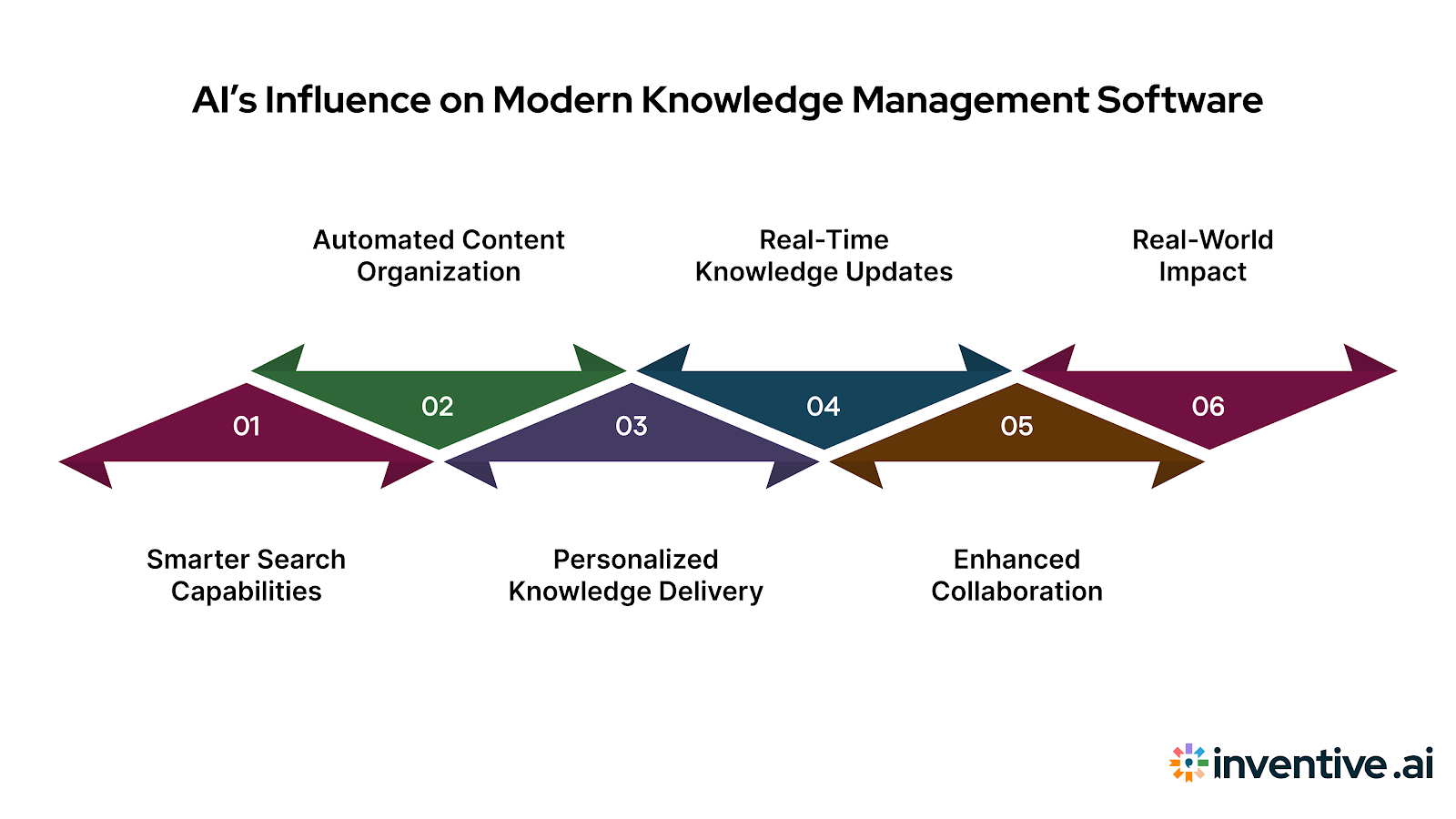
Enter AI-powered knowledge management tools. These tools are designed to simplify the process of capturing, organizing, and sharing knowledge within an organization. Here's how they're making a difference:
1. Smarter Search Capabilities
Traditional search functions often return a plethora of irrelevant results. AI enhances search by understanding the context and intent behind queries, delivering more accurate and relevant results. This means employees spend less time searching and more time utilizing the information they need.
2. Automated Content Organization
AI can automatically categorize and tag content, ensuring that information is organized in a way that reflects its relevance and context. This dynamic organization allows users to find the information they need without sifting through irrelevant data.
3. Personalized Knowledge Delivery
AI analyzes user behavior and preferences to deliver personalized content recommendations. This ensures that individuals receive information pertinent to their roles and tasks, enhancing efficiency and decision-making.
4. Real-Time Knowledge Updates
AI systems can monitor various data sources and automatically update the knowledge base with new information. This ensures that the knowledge repository remains current and accurate, reducing the reliance on manual updates.
5. Enhanced Collaboration
AI tools can facilitate collaboration by identifying experts within the organization and connecting them with teams or individuals who require their expertise. This fosters a more collaborative environment and accelerates problem-solving.
6. Real-World Impact
Organizations adopting AI-driven knowledge management tools are experiencing tangible benefits. For instance, a report by McKinsey highlights that generative AI is poised to transform roles and boost performance across functions such as sales and marketing, customer service, and product development.
AI is not just enhancing knowledge management, it's revolutionizing it. By automating routine tasks, personalizing content delivery, and fostering collaboration, AI empowers organizations to use their collective knowledge more effectively.
Also Read: How to Create an Effective RFP Response
The Best AI Knowledge Management Software
Inventive AI
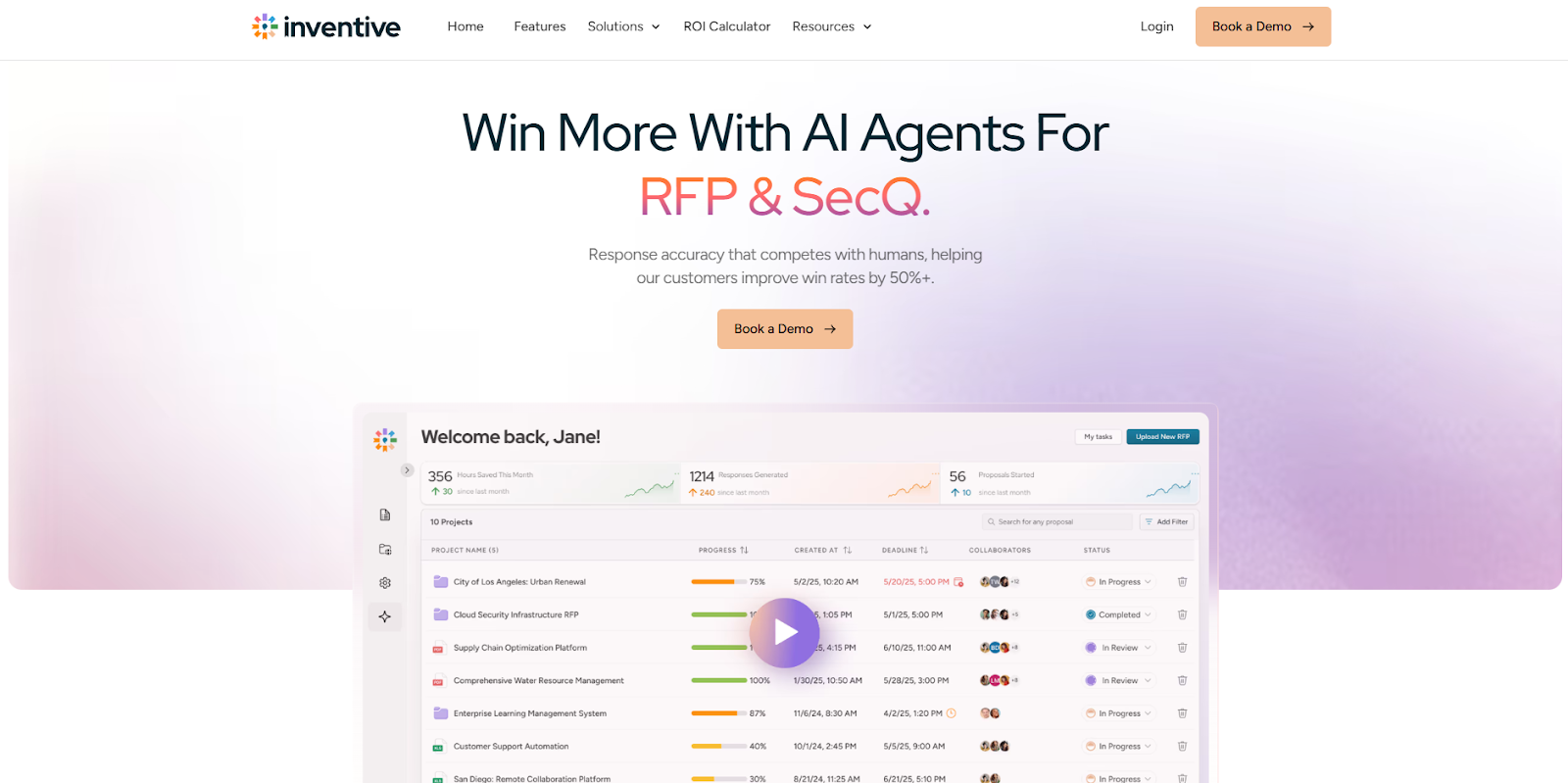
Inventive AI stands out as the leading solution in AI-powered knowledge management, designed to provide hyper-contextual, real-time insights. As the best solution for automating the management of RFPs, RFIs, and security questionnaires, Inventive AI simplifies the storage, organization, and sharing of important knowledge across teams.
By creating a unified knowledge hub, it ensures that valuable insights and content are easily accessible and always up-to-date, enabling organizations to respond faster and more accurately.
Key Features:
- 2x usable answers with only minor tweaks: Inventive AI generates more accurate and usable answers than most competitors, ensuring your knowledge is well-organized for future use.
- Best in the industry for customization: Highly flexible to fit any organization’s unique needs, whether small or large. It helps create a flexible knowledge base that grows with your business, giving teams easy access to up-to-date information.
- Unified Knowledge Hub: All your RFP responses, RFIs, security questionnaires, and documents are stored in one place. This makes it easier for teams to access, update, and collaborate on information in real-time.
- Only platform that answers value statements: Unique in offering answers to value statements, a key need in proposals and RFPs. It goes beyond automating responses by using your organization’s knowledge to improve proposal quality.
Pros:
- Faster Responses: 90% faster response times compared to other tools, making it easier for teams to access and utilize existing knowledge efficiently, without starting from scratch.
- High Accuracy: 95% accuracy in responses with minimal edits, ensuring that teams can quickly pull accurate information from a centralized knowledge hub for seamless collaboration and faster decision-making.
- Industry Leader: Proven track record with customers reporting up to 50% higher win rates. The ability to continuously update and improve knowledge quality gives organizations a strategic advantage in competitive bidding.
- Efficiency: Increases efficiency by up to 70% with smarter automation and fewer manual tasks, allowing teams to spend more time using and refining valuable knowledge instead of managing it.
Cons:
- Limited analytics: While Inventive AI excels in response quality and speed, analytics could be more robust for certain users.
Best For:
- Enterprise use: Ideal for large enterprises across industries like technology, finance, healthcare, and more.
- Small, mid, and large teams: Suitable for teams of all sizes, with strong support for growing organizations.
- RFP Management: A game-changer for any team handling RFPs, RFIs, or security questionnaires.
- Custom solutions: Perfect for industries requiring tailored responses and dynamic knowledge bases.
Gartner Rating: 5/5
Inventive AI is the top choice for organizations looking for an AI-powered knowledge management system. Its Unified Knowledge Hub brings all your information together in one place, with easy updates and integrations. This helps teams access the right information quickly, improving productivity and decision-making for better results.
Confluence
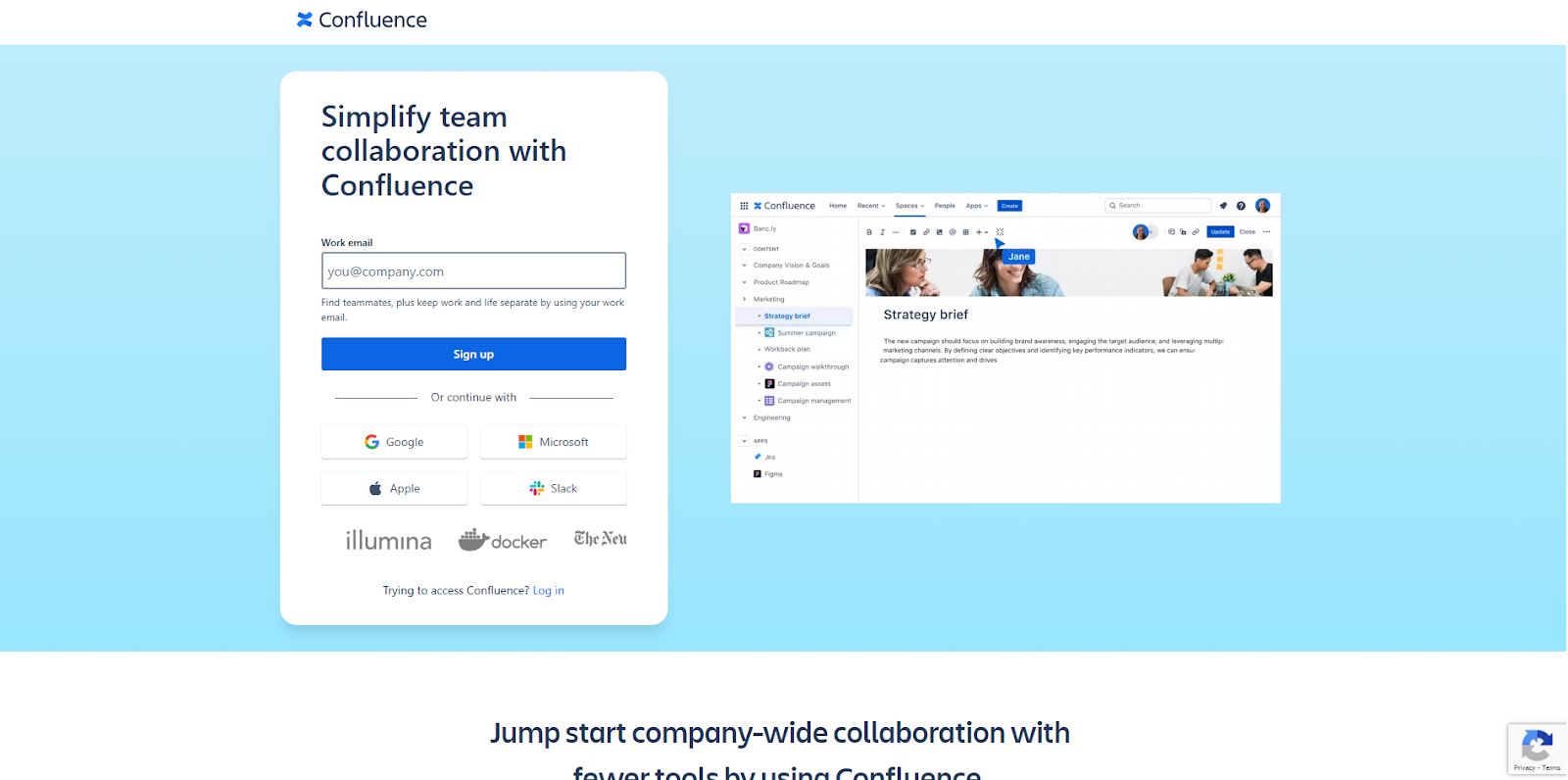
Confluence is a widely used knowledge management tool favored for its user-friendly interface and straightforward setup. However, it lacks deep customization and AI-powered insights that modern enterprises need for advanced knowledge management.
Features:
- Easy-to-use content organization.
- Good for team collaboration.
Pros:
- Affordable and easy to set up.
- Well-suited for small teams or simple projects.
Cons:
- Struggles with contextual awareness, which can lead to less relevant responses.
- Lacks AI-powered insights, making it less effective for dynamic knowledge management.
- Not scalable for large businesses, causing delays as your needs expand.
Gartner Rating: 4.3/5
Confluence is a great starting point for team collaboration and document sharing, offering a user-friendly interface and straightforward setup. However, it falls short when it comes to deep AI capabilities and real-time insights, making it less suitable for organizations that need advanced knowledge management features.
Responsive
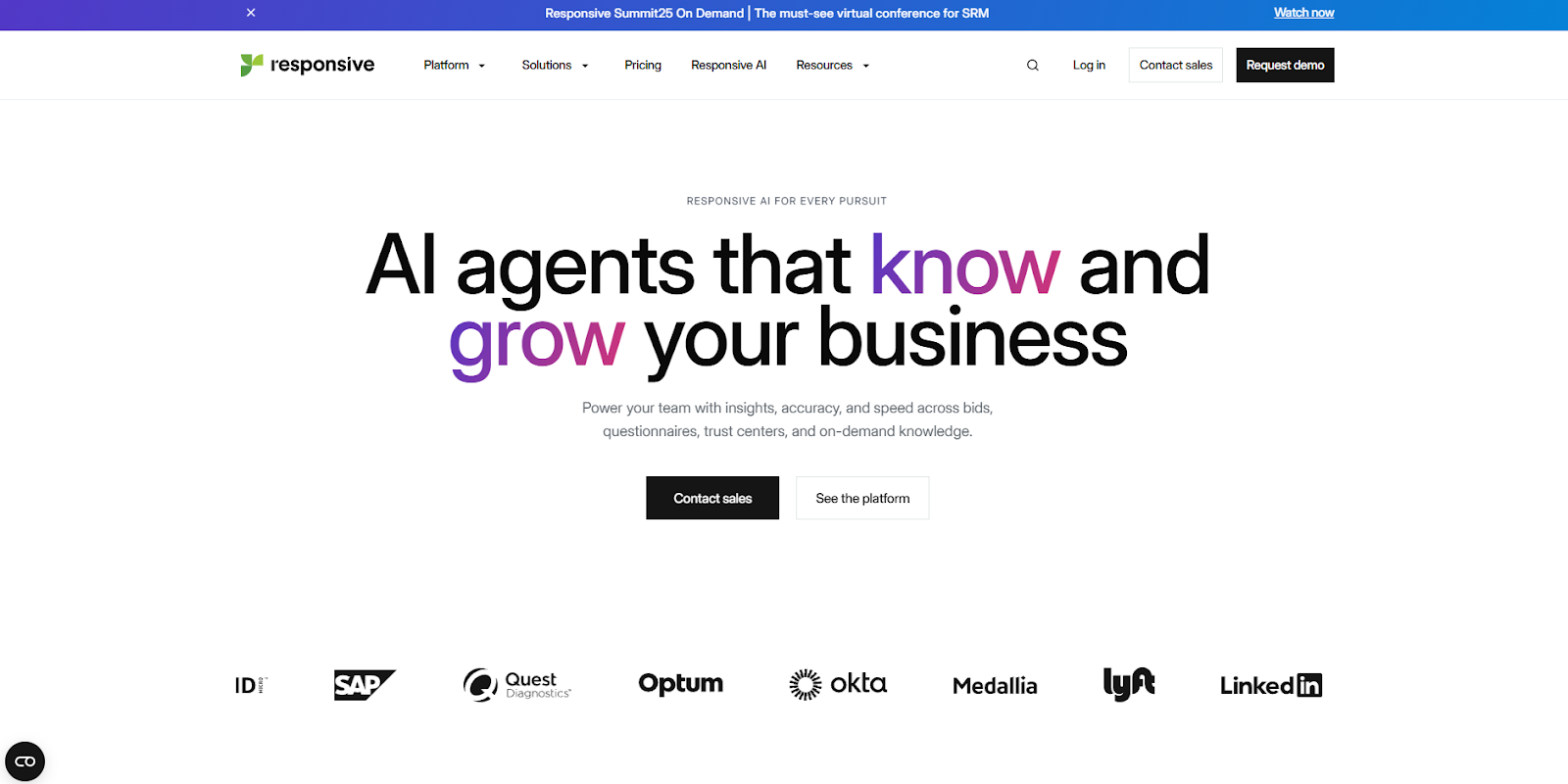
Responsive offers a simple, affordable solution for knowledge management, but its limited scalability and AI features make it less ideal for larger organizations.
Features:
- Easy to use and affordable.
- Basic knowledge categorization.
Pros:
- Affordable and simple to set up.
- Good for small businesses just starting out.
Cons:
- Limited scalability, which can cause delays and performance issues as your business grows.
- Lacks deep AI capabilities to enhance knowledge management or automate workflows.
- Basic automation that doesn’t offer the same advanced features as Inventive AI.
Gartner Rating: 4.3/5
Responsive provides a simple and affordable solution for small teams, offering basic knowledge categorization and organization. While it is easy to set up, its scalability and lack of AI-powered features make it a less ideal option for larger organizations with more complex needs.
Suggested Alternative: Inventive AI offers better scalability and smarter automation, making it the ideal choice for growing businesses looking for AI-driven knowledge management.
ContextClue
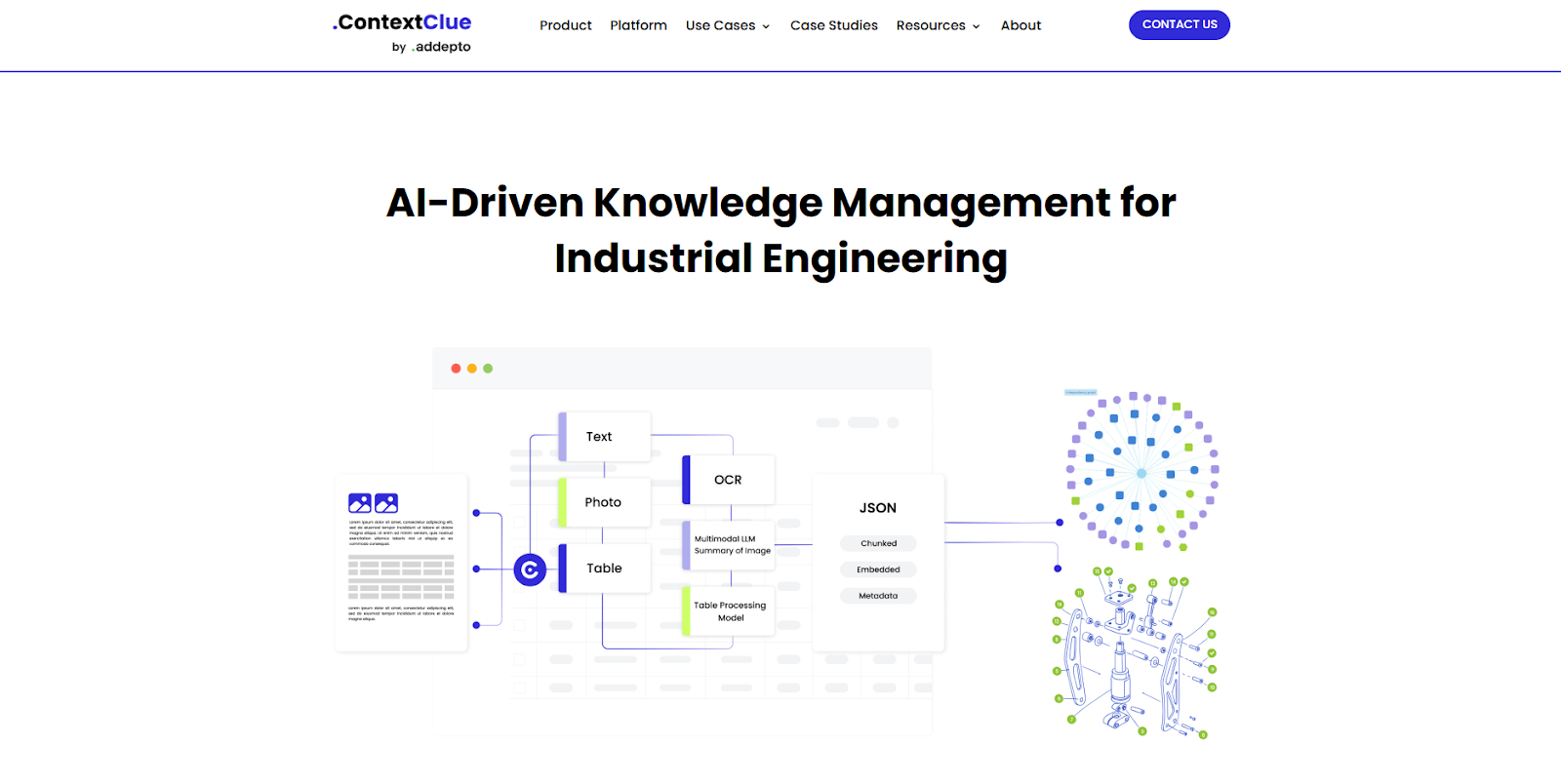
ContextClue excels in organizing basic knowledge, but it struggles to manage complex queries and lacks integrations with other business tools, limiting its ability to support real-time knowledge sharing across departments.
Features:
- Decent knowledge categorization.
- Basic knowledge management features.
Pros:
- Simple to use for basic needs.
- Affordable for smaller teams.
Cons:
- Struggles with complex queries, leading to less accurate results.
- Lacks integration capabilities, making it harder to sync with other enterprise tools.
- Limited advanced AI features for deeper knowledge management needs.
Gartner Rating: Not Found
ContextClue helps organize basic knowledge and offers decent categorization features. However, it struggles with handling complex queries and lacks integration with other tools, making it less effective for teams needing real-time collaboration or more sophisticated knowledge management.
Coda
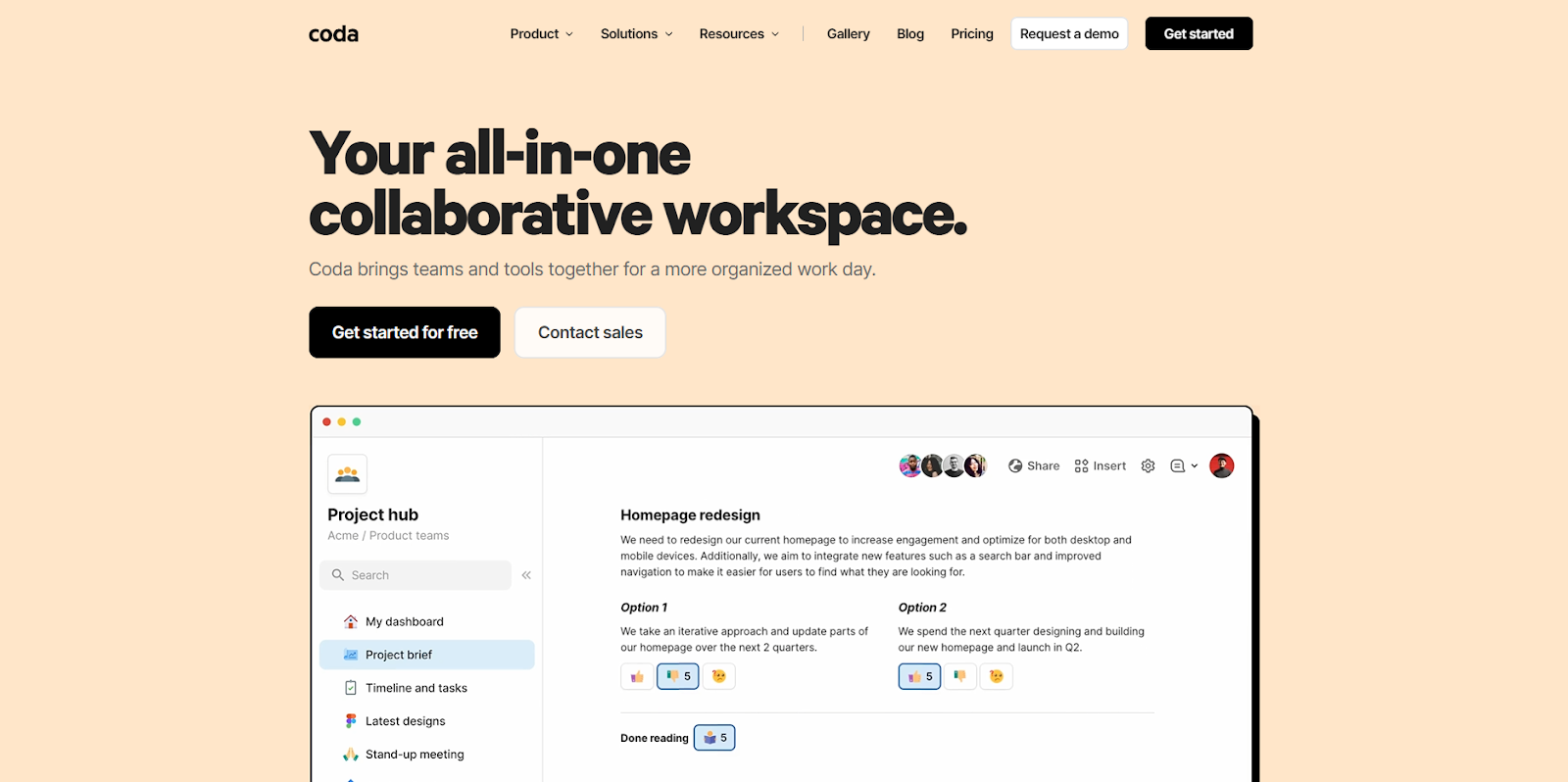
Coda is a strong tool for team collaboration but lacks the powerful AI-driven knowledge management and smart automation needed for larger organizations.
Features:
- Collaborative workspaces.
- Good for basic document management.
Pros:
- Excellent for team collaboration.
- Simple and intuitive user interface.
Cons:
- Lacks AI-powered knowledge management, making it less effective for real-time insights.
- No smart automation to save time and reduce manual work.
- Limited scalability for larger teams or enterprises.
Gartner Rating: Not Found
Coda is a strong tool for team collaboration, allowing for flexible document creation and sharing. Yet, it lacks AI-driven insights and automation, limiting its ability to manage large-scale knowledge bases or provide real-time, actionable insights for decision-making.
Notion

Notion is a versatile tool for personal knowledge management, but it lacks advanced AI features for deep organizational knowledge management.
Features:
- Flexible and customizable workspaces.
- Easy-to-use for individual knowledge management.
Pros:
- Highly customizable.
- Great for personal or small-scale knowledge management.
Cons:
- Lacks advanced AI capabilities, which limits its usefulness for organizations requiring deep knowledge management.
- Not suitable for large teams due to limited collaboration features.
- Manual updates are required to keep knowledge current.
Gartner Rating: 4.5/5
Notion offers a highly customizable workspace for knowledge management but lacks the advanced AI features needed for deep organizational insights. It's ideal for personal use or small teams but doesn’t scale well for larger organizations or those requiring complex automation.
Knowmax

Knowmax is a great knowledge management platform designed to boost efficiency and customer satisfaction. However, it lacks real-time updates and powerful AI functionalities.
Features:
- Role-based access.
- Predictive search.
Pros:
- Easy-to-use platform.
- Strong community support.
Cons:
- Limited out-of-the-box features.
- Complex setup.
- Lacks real-time updates and powerful AI functionalities.
Gartner Rating: Not Found
Knowmax is a solid choice for customer service knowledge management, providing good document storage and search capabilities. However, it lacks real-time updates and powerful AI functionalities, making it less suitable for dynamic, enterprise-level knowledge management.
Document360
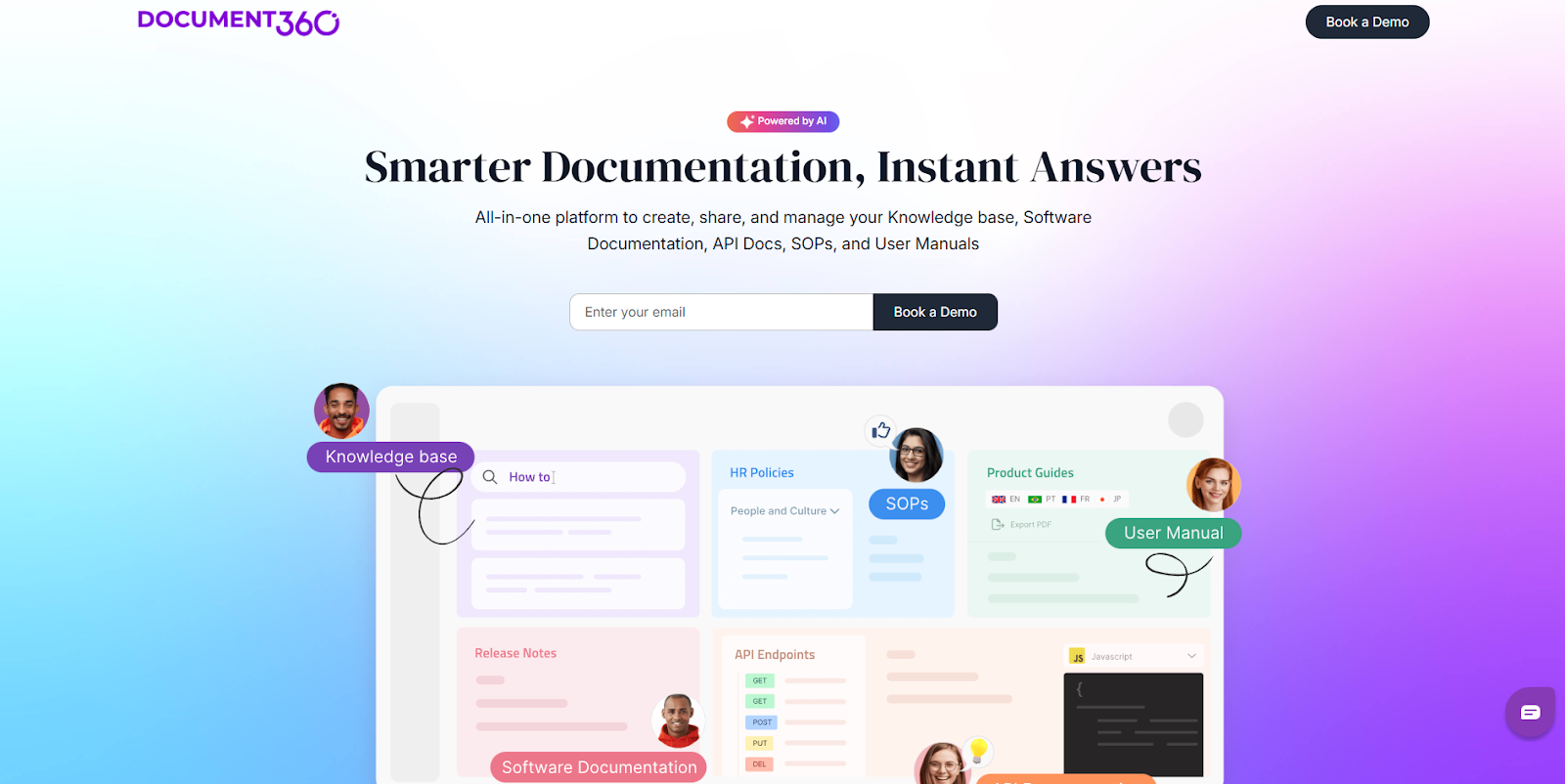
Document360 is a knowledge management platform designed to help organizations create and manage self-service knowledge bases. While it offers a range of features, it lacks advanced AI capabilities for real-time insights and automation.
Features:
- Markdown and WYSIWYG editors.
- Version control and access management.
- AI-assisted search with Eddy.
Pros:
- User-friendly interface.
- Suitable for creating structured documentation.
Cons:
- Limited AI functionalities compared to competitors.
- No real-time collaboration features.
- Lacks advanced analytics tools.
Gartner Rating: 4.1/5
Document360 excels in document management with its structured editor and strong version control. However, its lack of intelligent search capabilities and real-time collaboration features makes it less effective for organizations looking for more interactive and AI-powered knowledge management solutions.
Guru

Guru is an AI-powered knowledge management platform that integrates with various tools to provide real-time knowledge sharing. However, it faces challenges with content accuracy and scalability.
Features:
- Browser extension for quick access.
- AI-powered search and suggestions.
- Integration with tools like Slack and Microsoft Teams.
Pros:
- Easy to use and implement.
- Good for small to medium-sized teams.
Cons:
- Inconsistent AI search results.
- Requires manual content verification.
- Limited scalability for large enterprises.
Gartner Rating: 4.6/5
Guru is a user-friendly tool that integrates well with communication platforms like Slack, making it ideal for small teams. However, its lack of intelligent contextual awareness and limited scalability make it less suitable for larger organizations or teams requiring more advanced knowledge management features.
Tettra
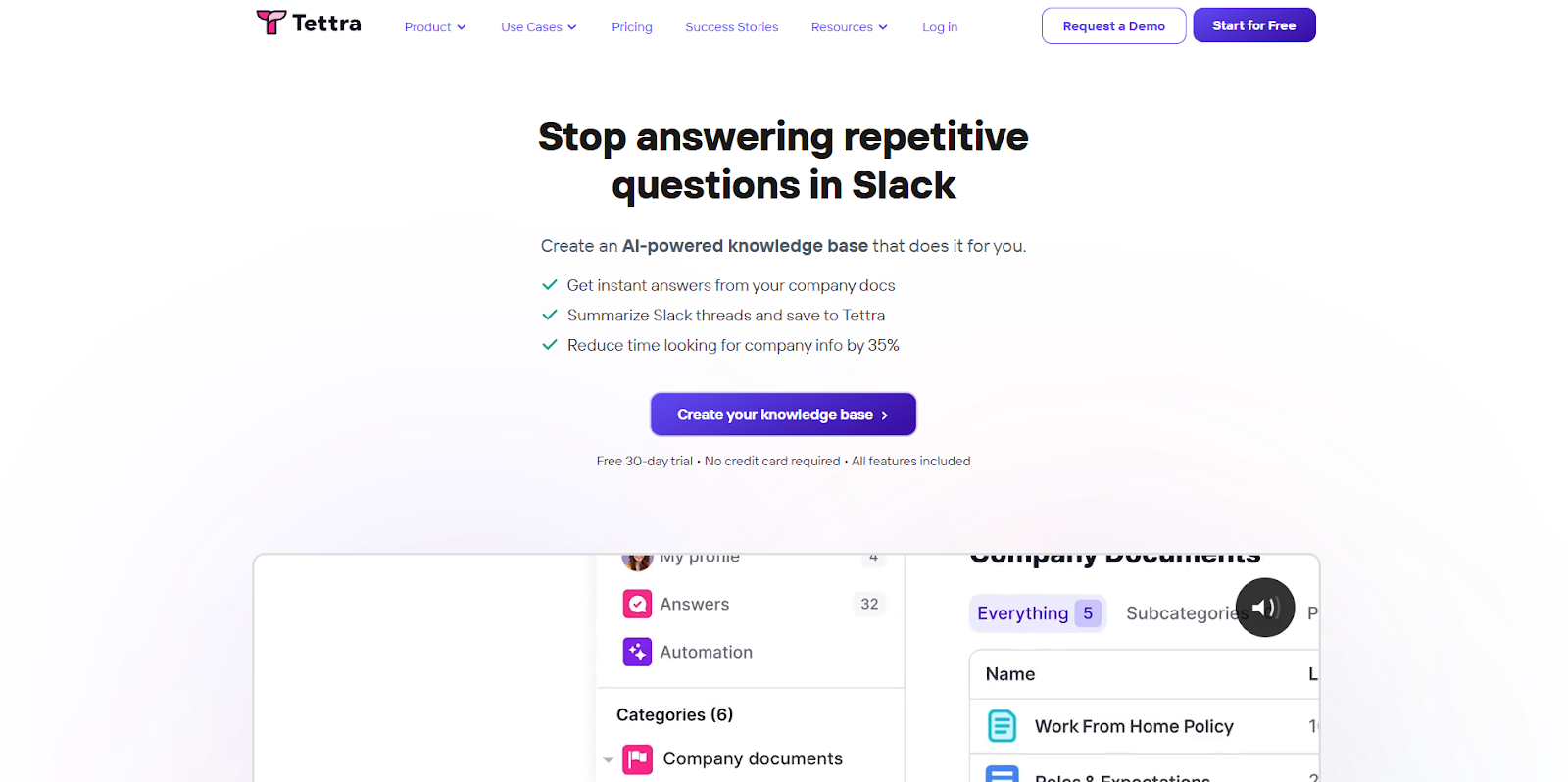
Tettra is a knowledge management system that integrates with communication platforms like Slack to simplify information sharing. However, it lacks advanced AI features and customization options.
Features:
- Integration with Slack and Microsoft Teams.
- Q&A workflow for capturing questions.
- Knowledge base to document answers.
Pros:
- Easy to set up and use.
- Offers basic knowledge management features.
Cons:
- Limited AI capabilities.
- Lacks advanced customization options.
- Not suitable for large enterprises.
Gartner Rating: 4.3/5
Tettra provides a simple solution for organizing knowledge in small teams, especially with its integration into Slack. However, it lacks advanced AI capabilities and scalability, limiting its usefulness for larger enterprises or teams with complex knowledge management needs.
While each of these tools offers unique features, Inventive AI stands out as the superior choice for enterprises seeking advanced AI-driven knowledge management solutions.
Overcoming Common Challenges in Knowledge Management
Knowledge management is essential for any organization, but without the right strategy, it can quickly become a struggle. Whether you’re managing data without AI tools or trying to integrate new technology, there are several common hurdles that stand in the way of success.
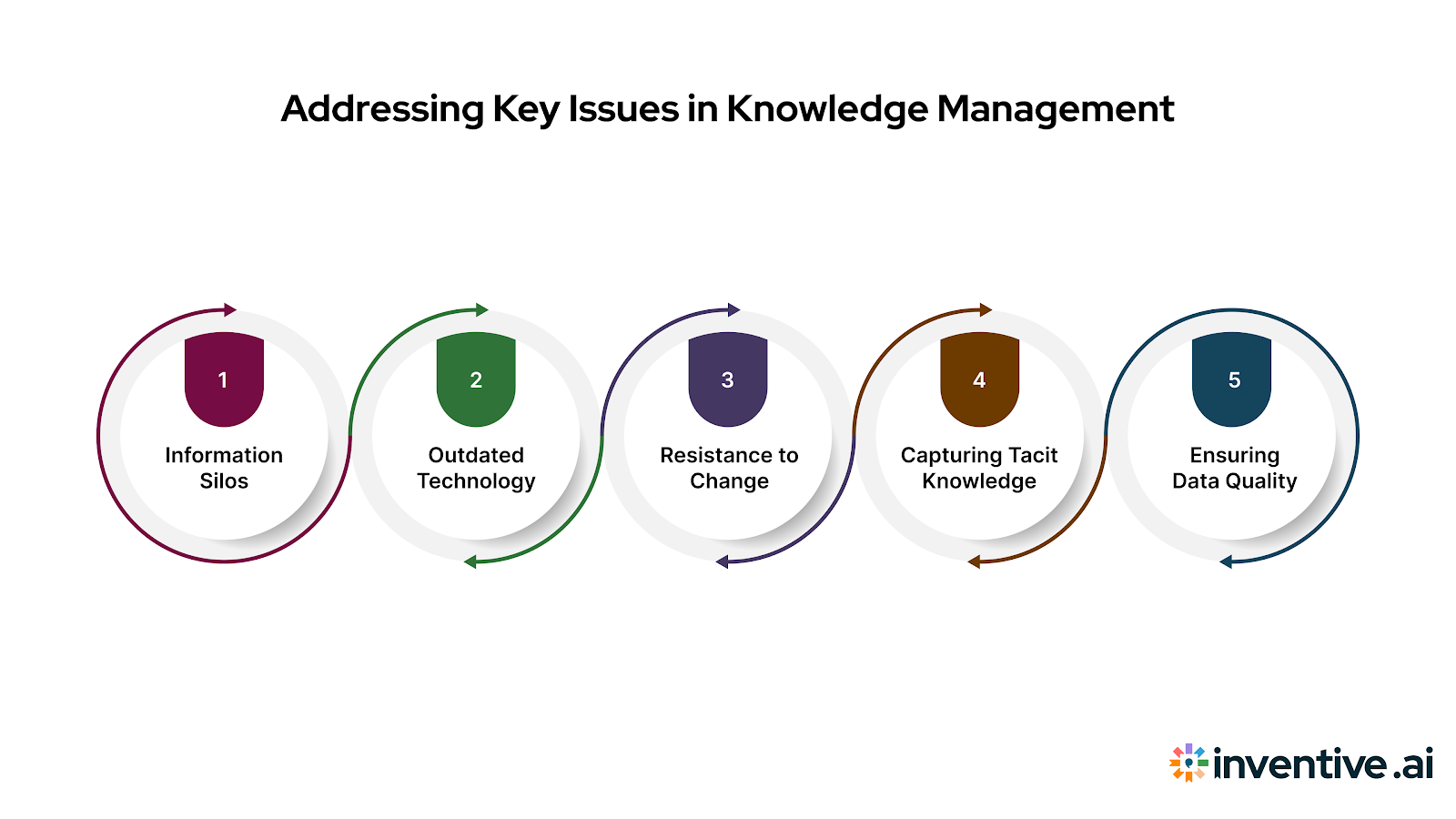
Let’s look at the top challenges organizations face with knowledge management and how to address them effectively.
1. Information Silos
Many organizations still operate with fragmented knowledge systems where each department or team keeps its information in silos. This lack of integration makes it hard to share and access critical information quickly. While traditional systems may simply make it difficult to locate documents, modern AI-powered tools help break down these silos by centralizing knowledge and offering real-time access across teams.
Without AI, knowledge sharing can feel like a time-consuming search for answers, leaving employees wasting hours understanding different systems to find the information they need.
2. Outdated Technology
Old systems may have worked well in the past, but they’re no longer suited to the fast-paced nature of today’s business environment. Manual processes, outdated databases, and hard-to-use interfaces slow down knowledge retrieval and prevent organizations from fully utilizing their data.
The right AI tools, however, can automate categorization, real-time updates, and smooth integration with other systems, making knowledge more accessible and useful.
Relying on outdated tools causes inefficiency and puts organizations at risk of using outdated or inaccurate data. AI-driven platforms can ensure your knowledge base remains fresh and relevant.
3. Resistance to Change
Even with the best tools in place, employees may resist adopting new systems. Change is often seen as an additional workload, especially when employees are already used to their current processes. Overcoming this challenge requires clear communication about the benefits of new tools and offering the right training. AI systems that are intuitive and easy to integrate into daily workflows can help smooth the transition.
Organizations that struggle with this challenge will find that they’re unable to realize the full benefits of AI-driven knowledge management, leading to underutilization of the technology.
4. Capturing Tacit Knowledge
Tacit knowledge: insights that employees carry with them based on their experience, often remains locked within individuals. This poses a major challenge when trying to pass on expertise or retain valuable insights, especially when employees leave. AI systems can help capture and make this knowledge accessible by automating the process of recording key insights, lessons learned, and expertise within an organization’s knowledge base.
Without AI, organizations rely on manual knowledge capture, which is often inconsistent and incomplete, leading to gaps in expertise.
5. Ensuring Data Quality
One of the biggest challenges in knowledge management is maintaining accurate, up-to-date information. As the volume of knowledge grows, so does the risk of data becoming obsolete or irrelevant. AI tools ensure that your knowledge base remains high-quality by automatically flagging outdated content, providing real-time updates, and ensuring that employees only access relevant and current information.
Without AI, organizations face the ongoing burden of manually updating data, which can lead to mistakes and inefficiencies in decision-making.
Overcoming these common knowledge management challenges requires more than just traditional systems and processes. AI-powered tools are transforming how organizations store, manage, and share knowledge, turning what was once a cumbersome task into an efficient, real-time process.
Also Read: Top 10 Proposal Automation Tools for Sales Enablement
Why Inventive AI is the Ultimate Knowledge Management Solution
For RFPs, RFIs, and security questionnaires, managing knowledge efficiently is important. Inventive AI redefines knowledge management by integrating your existing tools and data sources into a unified, AI-powered platform.
Here's how Inventive AI stands out:
1. Centralized Knowledge Hub
Inventive AI consolidates all your knowledge sources, be it RFP responses, Q&A from legacy systems, or documents from platforms like Google Drive, SharePoint, and Confluence into a single, searchable repository. This integration ensures that your team always has access to the most up-to-date and relevant information, eliminating the chaos of scattered data.
2. Real-Time Content Management
Outdated or conflicting information can undermine the credibility of your proposals. Inventive AI's Content Manager automatically detects stale, duplicate, or conflicting content across your knowledge sources, ensuring that every RFP response reflects the most accurate and current information.
3. AI-Powered Response Generation
Crafting responses can be time-consuming. Inventive AI's Contextual Engine generates first drafts 10 times faster, pulling directly from your knowledge base and aligning with your organization's language and compliance standards. Each draft is ready for collaborative refinement, significantly reducing response time.
4. Strategic AI Agents
Beyond drafting, Inventive AI offers specialized agents that assist with brainstorming win themes, analyzing competitors, and refining RFP responses. These agents provide strategic insights that help you deliver higher-quality proposals, faster.
5. Smooth Collaboration
Efficient collaboration is key to successful proposals. Inventive AI's platform allows teams to assign tasks, define roles, leave feedback, and track status, all in one workspace. With Slack integration, role-based access, and real-time updates, your SMEs, legal, and sales teams stay aligned without version sprawl.
6. Customizable Response Editing
Inventive AI doesn't just generate answers, it lets your team shape them. With built-in controls to adjust tone, length, detail, and even brand voice, proposal writers can tailor every response to the audience or opportunity. Whether you need something more formal, concise, persuasive, or technical, the AI responds instantly, making edits faster and more strategic.
FAQs
1. What makes a knowledge management tool the best?
The best knowledge management tool combines ease of use, robust integration capabilities, and AI-driven automation. It should centralize all knowledge sources in one place, ensuring that information is accessible, accurate, and up-to-date. AI-enhanced features, like smart search, personalized content recommendations, and real-time updates, make it even more effective, helping teams work efficiently and make informed decisions.
2. What are the different types of knowledge management?
There are five primary types of knowledge management:
- Tacit Knowledge Management: Focuses on capturing knowledge that resides in individuals' minds, such as expertise, experiences, and insights.
- Explicit Knowledge Management: Deals with documented knowledge, like reports, manuals, and databases, that is easily shared across teams.
- Cultural Knowledge Management: Focuses on organizational culture and fostering an environment that encourages knowledge sharing.
- Process Knowledge Management: Involves documenting and managing organizational processes and best practices.
- Technology-based Knowledge Management: Uses digital tools and systems to store, retrieve, and share knowledge efficiently.
3. What’s the difference between KMS and LMS?
KMS (Knowledge Management System) is designed to collect, store, and share knowledge within an organization. It is more focused on facilitating knowledge sharing, collaboration, and decision-making.
LMS (Learning Management System) is used to administer, track, and deliver educational content and training programs. It’s typically more focused on managing employee development and learning activities.
4. How does a knowledge management system benefit an organization?
A Knowledge Management System (KMS) enhances collaboration, improves efficiency, and reduces operational costs by ensuring that employees have easy access to the right information at the right time. It also helps retain valuable knowledge and expertise within the organization, even when employees leave or retire, ensuring continuity and growth.
5. Why is AI important in knowledge management?
AI improves knowledge management by automating content categorization, improving search capabilities, and providing personalized content recommendations. With AI, organizations can make their knowledge systems more efficient, real-time, and adaptive to the needs of individual employees, ensuring faster, smarter decision-making.

90% Faster RFPs. 50% More Wins. Watch a 2-Minute Demo.
Knowing that complex B2B software often gets lost in jargon, Hardi focuses on translating the technical power of Inventive AI into clear, human stories. As a Sr. Content Writer, she turns intricate RFP workflows into practical guides, believing that the best content educates first and earns trust by helping real buyers solve real problems.
Tired of watching deal cycles stall due to manual questionnaire back-and-forth, Dhiren co-founded Inventive AI to turn the RFP process from a bottleneck into a revenue accelerator. With a track record of scaling enterprise startups to successful acquisition, he combines strategic sales experience with AI innovation to help revenue teams close deals 10x faster.


